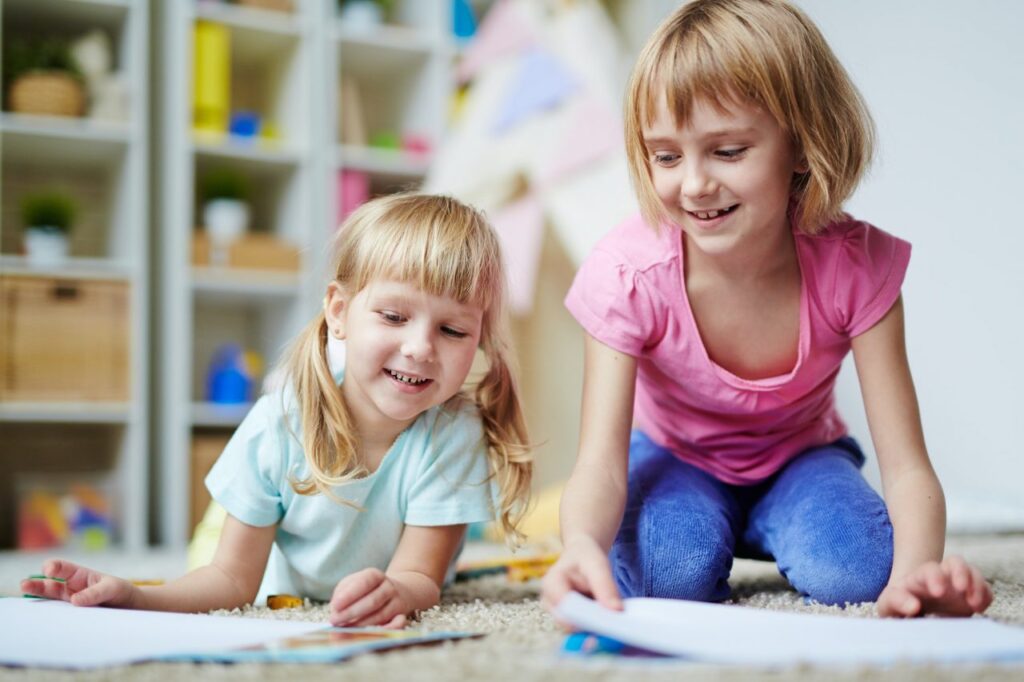Boosting Emotional Development Through Parent-Child Communication
Enhance emotional development by having meaningful talks with your children. Effective parent-child communication is crucial to nurturing their emotional intelligence and building strong connections. Create a safe and supportive space where they can express themselves openly. Understand their emotions by listening actively and acknowledging their feelings. By building empathy and connection through dialogue, you strengthen the bond with your child. Setting healthy boundaries and nurturing emotional intelligence are essential for their growth. Remember, a secure and open communication environment lays the foundation for their emotional well-being and resilience.
Key Takeaways
- Open and honest conversations enhance emotional literacy and intelligence.
- Active listening and validation promote empathy building.
- Modeling effective communication skills sets a positive example for children.
- Establishing boundaries creates a safe and nurturing environment for communication.
- Understanding and acknowledging children’s emotions fosters emotional development.
Importance of Parent-Child Communication

Effective parent-child communication plays a pivotal role in fostering emotional development in children. By engaging in open and honest conversations, parents can help their children develop emotional literacy, which is essential for understanding and managing their feelings effectively.
When parents actively listen, validate their child’s emotions, and encourage them to express themselves, they contribute to empathy building and the development of healthy relationships.
Research shows that children who’ve parents that communicate effectively with them tend to have higher emotional intelligence and are better equipped to navigate social interactions. By creating a safe and supportive environment for children to express their emotions, parents can teach them how to communicate their feelings constructively and develop empathy towards others.
Furthermore, when parents model effective communication skills themselves, they set a positive example for their children to follow in their own relationships. This fosters a deep sense of trust and connection between parents and children, laying the foundation for strong, healthy relationships in the future.
Creating a Safe Space

Establishing a secure and nurturing environment is crucial for fostering open and honest parent-child communication, which is foundational for emotional development in children.
To create a safe space for effective communication, it’s imperative to establish boundaries. Setting clear guidelines helps children understand what behavior is acceptable and encourages respectful interactions.
Embracing vulnerability is also paramount in nurturing a safe environment. By showing your child that it’s acceptable to express emotions and talk about difficult topics, you create a space where they feel comfortable sharing their thoughts and feelings without fear of judgment.
Research shows that when children feel safe and supported in their communication with parents, they’re more likely to develop strong emotional intelligence and coping skills.
Understanding Children’s Emotions
Understanding your child’s emotions is key to fostering a strong parent-child bond and promoting healthy emotional development. Emotion regulation, the ability to manage and express emotions appropriately, is an essential skill that children develop from a young age. By recognizing and acknowledging your child’s emotions, you can help them learn how to regulate their feelings effectively.
Research shows that children who’ve a better understanding of their emotions tend to have fewer behavioral issues and better social interactions.
Developing empathy is another vital aspect of understanding children’s emotions. Empathy involves recognizing, understanding, and sharing the feelings of another person. By demonstrating empathy towards your child’s emotions, you not only validate their feelings but also teach them how to empathize with others.
This sets the foundation for healthy relationships and effective communication skills in the future.
Building Empathy and Connection

Fostering empathy and connection between parents and children is an essential aspect of nurturing healthy emotional development. Empathy building involves teaching children to understand and share the feelings of others, fostering kindness and compassion. Research shows that children who develop empathy early on tend to have stronger social relationships and better emotional regulation skills.
To build empathy, parents can engage in activities that promote perspective-taking, such as discussing characters’ emotions in stories or reflecting on different viewpoints in conflicts.
Connection bonding is equally vital in building a strong parent-child relationship. Spending quality time together, engaging in shared activities, and actively listening to your child can strengthen the emotional bond between you. Research suggests that children who feel connected to their parents are more likely to open up about their emotions and seek comfort when needed.
Encouraging Open Dialogue
To strengthen your bond with your child, fostering open dialogue is key.
By cultivating trust through communication, you create a safe space for your child to express themselves freely.
This practice not only fosters understanding but also strengthens the connection between you and your child.
Cultivating Trust Through Communication
Encouraging open dialogue between parents and children is essential for cultivating trust and fostering emotional development within the family dynamic. Trust building and emotional bonding are foundational elements in creating a secure attachment between parents and children.
Research shows that effective communication plays a crucial role in nurturing this attachment and fostering a sense of security and trust within the family unit.
By engaging in open and honest conversations with your children, you create a safe space where they feel heard, valued, and understood. This type of communication not only strengthens the parent-child relationship but also promotes emotional development and resilience in children.
When children feel comfortable expressing their thoughts and emotions without fear of judgment, they’re more likely to develop a secure attachment to their parents.
Fostering Understanding and Connection
Establishing a foundation of open dialogue within the parent-child relationship is pivotal for fostering understanding and connection between both parties.
Engaging in empathy-building activities can greatly enhance the emotional bond between you and your child. By incorporating emotional check-ins into your routine, you create a safe space for your child to express their feelings and thoughts, nurturing a deeper understanding of their emotional world.
Moreover, connecting through validation is essential for reinforcing your child’s sense of self-worth and fostering trust within the relationship. Acknowledging and accepting your child’s emotions without judgment strengthens the connection and encourages open communication.
Understanding non-verbal cues such as body language and facial expressions can also help you decipher your child’s unspoken emotions, leading to a more profound connection based on empathy and mutual comprehension.
Practicing Active Listening

When you actively listen to your child, you engage with empathy, showing them that their feelings are valid and important.
Reflecting their feelings accurately can help them feel understood and supported, strengthening your bond and promoting healthy emotional development.
Research suggests that practicing active listening can enhance communication skills and emotional intelligence in both children and parents.
Engaging With Empathy
By actively listening to your child with empathy, you can deepen your emotional connection and enhance their development in meaningful ways. Empathy exercises and emotional support play a vital role in fostering a positive parent-child relationship. Sensitivity training and compassion building are key components in developing empathy within the family dynamic. Research shows that children thrive in environments where they feel understood and validated.
When you practice active listening with empathy, you aren’t just hearing your child’s words but also understanding their feelings and perspective. This kind of engagement helps your child feel valued and builds their self-esteem.
Studies indicate that children who receive emotional support through empathetic listening tend to have higher emotional intelligence and better communication skills. By engaging with empathy, you create a safe space for your child to express themselves openly and honestly. This can lead to improved problem-solving abilities and a stronger emotional bond between you and your child.
Reflecting Feelings Accurately
Engaging in active listening by accurately reflecting your child’s feelings is a fundamental practice in nurturing their emotional development. By practicing empathy and mastering feeling recognition, you create a safe space for your child to express themselves openly.
Through active listening, you demonstrate that you value their emotions and opinions, fostering a strong parent-child bond built on trust and understanding.
Empathy practice involves not only hearing your child’s words but also understanding the emotions behind them. When you reflect their feelings back to them, it shows that you’re truly listening and trying to comprehend their perspective. This validation can help your child feel seen and heard, boosting their self-esteem and emotional well-being.
Feeling recognition is key to accurately reflecting your child’s emotions. By acknowledging and labeling their feelings, you help them develop emotional intelligence and learn how to express themselves effectively. This practice also teaches them how to regulate their emotions and communicate their needs in a healthy manner.
In essence, active listening with accurate feeling reflection lays the groundwork for strong emotional development in your child.
Setting Healthy Boundaries

Establishing clear and firm boundaries in your interactions with your child is essential for promoting healthy emotional development. Setting healthy limits fosters emotional growth and helps your child understand their own boundaries as well as respect the boundaries of others. By consistently reinforcing these boundaries with mutual respect, you provide a framework within which your child can flourish emotionally.
Research shows that children raised with well-defined boundaries tend to have higher self-esteem and better interpersonal skills. When boundaries are unclear or inconsistently enforced, children may struggle with understanding appropriate behavior and regulating their emotions effectively. By setting clear expectations and consequences, you help your child feel secure and understand the importance of respecting others’ boundaries too.
Nurturing Emotional Intelligence
How can you cultivate emotional intelligence in your child to support their overall well-being and social success? Emotional intelligence plays a vital role in a child’s development, affecting their ability to navigate relationships, handle stress, and communicate effectively.
One key aspect of nurturing emotional intelligence is teaching emotional regulation. Help your child identify and understand their feelings, encouraging them to express emotions in a healthy manner. By modeling self-regulation yourself, you can demonstrate how to manage emotions constructively, serving as a powerful example for your child to follow.
Additionally, mindful communication is essential in fostering emotional intelligence. Encourage open dialogue with your child, actively listening to their thoughts and feelings without judgment. Validate their emotions, showing empathy and understanding. By creating a safe and supportive environment for communication, you can help your child develop strong emotional awareness and interpersonal skills.
Through a combination of teaching emotional regulation and engaging in mindful communication, you can effectively nurture your child’s emotional intelligence, laying a foundation for their well-being and success in social interactions.
Frequently Asked Questions
How Can Parents Support a Child’s Emotional Development During Adolescence?
During adolescence, you can support your child’s emotional development by listening actively, validating their feelings, and encouraging open communication. By building resilience and nurturing empathy, you provide a safe space for growth.
What Are Some Practical Ways to Teach Children Emotional Regulation?
To teach children emotional regulation, try incorporating mindfulness exercises to promote self-awareness and coping strategies for handling strong emotions. Conduct regular emotional check-ins and engage in role-playing scenarios to help them practice managing their feelings effectively.
Can Parent-Child Communication Help Prevent Behavioral Issues in Children?
Yes, parent-child communication is essential in preventing behavioral issues. By actively listening, validating emotions, and establishing trust while setting boundaries, you can foster a healthy emotional development in children and create a strong parent-child relationship.
How Can Parents Handle Disagreements With Their Children About Emotions?
When handling disagreements with your child about emotions, focus on conflict resolution by actively listening and emotionally validating their feelings. Build empathy through open communication, understanding their perspective to foster a positive parent-child relationship.
What Role Does Cultural Background Play in Parent-Child Emotional Communication?
Cultural influences heavily impact parent-child emotional communication. Different communication styles and language barriers can affect how emotions are expressed and understood within families. Understanding these dynamics can lead to more effective and empathetic interactions.
Conclusion
To sum up, fostering healthy parent-child communication is essential for boosting emotional development in children.
By creating a safe space, understanding their emotions, and practicing active listening, you can build empathy and connection with your child.
Encouraging open dialogue and setting healthy boundaries will nurture their emotional intelligence.
Remember, the way you communicate with your child can have a lasting impact on their emotional well-being and overall development.
Keep up the good work!

Chad Adan Kace, a young dad from Vermont, shares his parenting journey with a touch of humor and lots of love. Father to a lively baby, he explores the joys and challenges of fatherhood through his stories.







